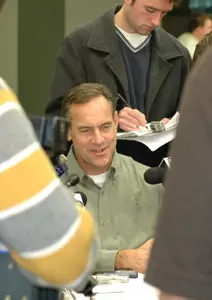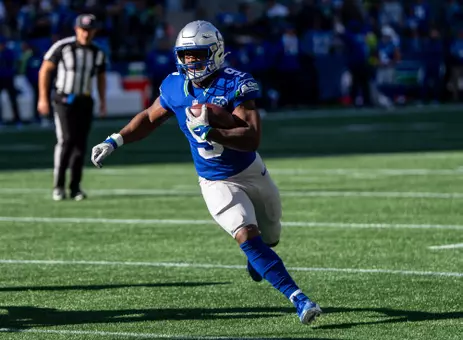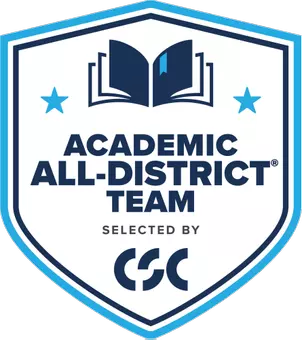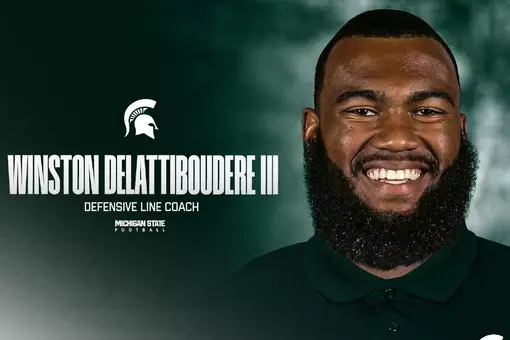Michigan State University Athletics

Grid Insider: Catching Up With Mark Dantonio
12/20/2006 12:00:00 AM | Football
Dec. 20, 2006
Opening statement . . .
Recruiting is going well. We're excited about where we're at. We've had a chance to get out in the state of Michigan and throughout the Midwest. I think the fact that we were able to get our staff together very quickly really helped us in terms of getting people out on the road with knowledge of the recruiting process and also with knowledge of who's out there in terms of Michigan, Ohio, etc. From that standpoint, I think that we got a jumpstart probably from where we possibly could have been. Recruiting has been going very well. We have to finish - just like everyone else in America - we have to finish.
On what he has seen (on film) from last season's players . . .
We've looked at a little bit of film today (Monday, Dec. 18) as a matter of fact. This is the first day of the so called recruiting "dead period." This is the first time that I can remember as a coach incidentally that you go four weeks now without having any contact with a recruit. It goes until Jan. 4, so that's a very long time period. In the past, it's been 12 days, 14 days, that type of thing. This is a little bit unusual, I think, to move the championship game back a week, then you have the coaches convention after that, so there's a lot to do. But in regards to players, we were in the office today going through a lot of different things. I watched a little bit of the Penn State game, and I thought (quarterback) Brian Hoyer looked very good. It looks like we graduated some seniors on the offensive line. The secondary looks like we have some guys returning. Up front, the linebackers, getting two out of three back. I was impressed and I think our players deserve our utmost respect. I was impressed with the fact that they had a coaching staff that got their team ready to play that last game, and that's a tough thing to do under the circumstances, so I respect the job they did in doing that. Two, I respect how our players played for that coaching staff and for themselves. They played hard and with excitement and emotion, which I think is a difficult thing to do under the circumstances. Also relative to where they were at within the conference (standings), with no opportunity to go to a bowl game, with those types of things, I think they played hard. I think that's a credit to their character as people and as football players, and they should be commended on that. I watched very little film other than the first half of that Penn State game, but obviously, that's a rivalry game as well and as I reminded our staff, I can't remember ever going to Penn State when I was here (as an assistant coach) and winning. I believe it was mentioned to the staff that we haven't won there since 1965, so that's not an easy thing to do. But I think they came with enthusiasm and effort and that's half the battle.
On the recruiting dead period . . .
It gives us a chance to get our feet on the ground for the week with Christmas coming up. There are a lot of things that have happened since we've gotten the job. Number one is we've left our families. We have to reconnect with them as well. It's the holidays and we all have children, so I think that's important and that's mission number one. It's important to sit down as a total staff and talk about things and get input from the trainers, strength coach, and operations director. It's key to get everybody in the same room to talk about our plan in terms scheduling spring practice, winter conditioning, coaching clinics, summer camps and Pro Day. All these little things you take for granted some times, just the calendar of events, we need to organize and designate a staff liaison.
From a recruiting standpoint, we've got to continue to find more players. I think recruiting is a numbers game. We really tried to start here in Michigan and expand from there. We're going to continue to do that, we're going to continue to expand and look at players who we qualify - I'm going to say it again - who we qualify as being able to play at this level and compete for championships. So we will continue to expand, but we've been all over the place, New Jersey, the Carolinas, Florida, Georgia. We have not been out West, but we probably need to go in that direction a little bit. Obviously, Ohio and Michigan are a top priority. There's a lot to do and the clock's running.
On the chances of bringing in a lot of junior college players . . .
Well,Wednesday is junior college signing day, but right now, with our situation the way it was - we came in here late November - I think it's too fast to go out and find a junior college guy to come out at midyear and know all there is to know about that guy from a character standpoint, academic standpoint, and player standpoint. If we take a junior college player, it will obviously be somebody who would probably come in May. We need to make those decisions not just based on film. We need to meet, evaluate, and get to know the people we're dealing with, so we'll hold on that right now in terms of the junior college prospects. We'll look at the prep schools in addition to the high school prospects.
On the recruits the staff was pursuing while at Cincinnati . . .
Well, the thing about Cincinnati is that it's a BCS football team, a BIG EAST football team, so a lot of guys we might not have been able to get into the door in some situations, but we knew them, had contact with them, and we had contact with their coaches. A lot of the guys had already been recruited by Michigan State. Almost all of them had received letters, initial recruiting contacts, or whatever from Michigan State. I think the thing we have to remember is that we were only two days late getting out, so from that standpoint, we were very early getting into the school and I think that was a big advantage for us. Naturally, some guys who had committed, changed their commitments. It's just the crazy world of the Internet and everything else we deal with in recruiting. I think that we're moving in the right direction. I think we have good people on the board, good names on the board, and valuable players that give us a lot of different opportunities.
On attending the high school Dream Team banquet in Detroit . . .
I think one of my jobs here at Michigan State is to be a service to the high school community. It's not just to win games; although I know based on the fan appreciation that was the number one thing I guess on Saturday night (when introduced at halftime of the home basketball game vs. Chicago State). I think you have to be a service to the high school community as well. I want to always be at that banquet. That banquet salutes and graduates the best of the best in the state of Michigan, and it's a special thing. I think that the Michigan State head football coach should always be there.
On beating the University of Michigan . . .
I've always been one to accept challenges and not to try to look past people at Michigan. The University of Michigan is our archrival. I think they've been very successful both in state and in the country in terms of their national reputation, and you have to respect that and admire that, but at the same time you have to embrace the rivalry and look forward to the challenge ahead.
On developing his own program . . .
Well, I think the first thing we have to institute now is to develop a relationship with our current players. If we come in here and try to strong arm people, I don't think that's how you get people on your side. You have to be a common denominator; you have to empower people; you have to develop a relationship and develop a trust that you're there for them as people. We'll do that gradually, and I'm sure there will be times when we need to confront people and take a strong tone. There will be changes within the program, just like there always are when somebody else comes in. I think it's not right or wrong, but what has worked in the past for those particular coaches and the people in the program. I'm sure there will be changes and some will embrace that change and other will fight it a little bit. The thing that we have to do is: we all have to go in the same direction and that's the most important thing.
 During Mark Dantonio's six-year stint as an assistion coach at Michigan State (from 1995-2000), the Spartans made four postseason bowl appearances. |
On the off-season workouts . . .
One of the things we were able to do was keep (head strength and conditioning coach) Ken Mannie here. Ken was here when I was here (as an assistant coach) with Nick Saban. I think as a matter of fact, Ken was one of Saban's first hires. Ken has been here since 1995, so I worked with him for six years. After working all that time with Nick Saban and Bobby Williams, a lot of the things we implemented at Ohio State were a direct reflection of what we did down here from a winter workout standpoint. I'm sure that he is on the same page that I am. As a matter of fact, we talked about things this morning, so I don't think there will be a vast difference from what has been done here in the past. Winter workouts aren't about discipline; they're about working through adversity when you get tired; it's about conditioning and it's about team building. Those are the things I think winter conditioning helps you with.
On how he overcomes adversity . . .
I've always tried to look at the reasons we didn't succeed and try not to blame people. I haven't made a tackle in a long time and I missed some then. It's not about one person not making a play. It's about everybody going in the same direction. It's a mindset. Losing doesn't mean you lose confidence. You get to a point as a player and as a coach, when you will do what you have to do to be successful. When we've been in adverse situations, we supported each other and realized it's about us. As soon as we focus on what we do, we will more successful not as players, but as people.
On preparing players for adverse situations . . .
There will be an adverse situation in every game. I was looking at the Penn State game today. In the first quarter, Penn State had three turnovers. Somehow, someway they made it through the adversity and won the football game. It doesn't matter how talented the player is we recruit, they are going to have some adversity. Whether it is distance from home, academics, social situation or whatever is, you will always have some adversity. There will always be someone better than you. It's just a matter of time until that person catches up to you. Overcoming adversity is something we will have to talk about constantly. Football is a game of inches, and if we do what we are supposed to do, good things can happen. How you respond to it is what makes you successful. That's the thing football teaches you to do. It teaches you when you get knocked down, you get back up. That's a life lesson that football teaches. We live in a society where people want things now. People think because a new coach or player comes here everything will immediately change. It's a total team thing that has to go in one direction. One player or decision doesn't make or break a football team. It's an accumulation of things. I think we live in a society that says if you are not successful, then change, but sometimes we have to stay the course. One thing Coach (Jim) Tressel has taught me is to be patient, reevaluate, develop your plan and go forward with that plan.
On unforced errors . . .
Unforced errors can hurt you. It's a form of discipline. I'm sure the past staff worked on it as well. Our thought process will always be: if you're not coaching it, you're letting it happen.
On promoting academics to recruits . . .
I learned over the course of time that just because you are a good player doesn't mean you are going to be successful as a person. Because you are a good player, it doesn't mean you are going to win a championship or make the final play of the game. A lot of this stems from my experiences at Youngstown State with Coach (Jim) Tressel. I was at Michigan State and he had just won three championships. I was speaking at a clinic and I told him somehow, someway, you've managed to harness the human spirit. That's what he has done. Therefore, I've taken the attitude that it is about more than football. It's about your academics, graduation, family and giving back to your community. It's certainly about becoming a better player. When you do all of those other things, then you have the ability to overachieve as a football player and win a championship. We played 18 people (on defense) in the (national) championship game at Ohio State and I believe 17 of them are in the NFL. Now, they were great players, but they overachieved as a team. It's got to go beyond wins and losses or else you would go crazy. It has to be about people and relationships. I'm blessed to be here, but did I ever think I would be the head coach at Michigan State? No. I would probably be happy as the high school coach anywhere because it's about kids and relationships. That's why I got into coaching, and that's why I will stay in coaching.
On spring practice . . .
We are going to work through five weeks of spring practice. We are going to go through things slowly. One of the things I believe is when you start to feel overwhelmed, you should slow the process down and make good decisions. We will slow it down and try to make good decisions and allow our football team to catch up.
On a spring game . . .
We will have a spring game (scheduled for Saturday, April 21 at 1:30 p.m. in Spartan Stadium). We'll have a draft and a game, so it will be competitive. I want the players to have fun.
On winning championships . . .
If you are a head football coach, you have to have a direction. You have to reach for championships. My goal is to take the next step up the ladder. If we don't preach that then how do we get the championship-type people here? Everybody wants to win a championship. I've won a conference championship, high school championship and a national championship. I can't tell you the difference between the elation. It's the same. Our goal in Cincinnati was to win a national championship, and I'm not afraid to say that. We had an opportunity to play five teams in the Top 10. If we beat those five teams, we're right there. Wake Forest is in the Orange Bowl. That's a great job of coaching, but you have to believe it. We go to Virginia Tech when it's ranked No. 9 in the nation and we're beating them 10-5 at halftime. When they've been behind at half, they've lost 61 times and won eight. You play the game in segments, and you play the game for the next play. You try to reach a championship level on every single play. I think you have to step out there and say those things. You have to truly believe in that. You have to give them evidence that if you do the little things right and play together as a team, then you have a chance to win that game.





